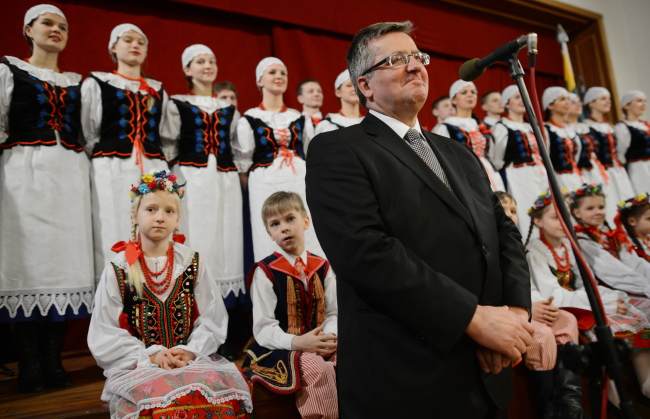
President Komorowski during a meeting with Lithuania's Polish minority: photo - PAP/Jacek Turczyk
The celebrations marked the 95th anniversary of the restoration of Lithuania, and chime in with mutual efforts towards a thaw in relations between the two countries.
“Today, we are realising separate national goals... but we are moving parallel in the same direction, we are together in the democratic world, together in NATO and together in the European Union,” Komorowski said during a speech on Daukantas Square, in front of the Presidential Palace, as cited by the Polish Press Agency (PAP).
Lithuanian head of state Dalia Grybauskaite did not refer to Poland in her address.
Later, in a meeting with representatives of the Polish minority in Lithuania, Komorowski pledged ongoing support for the Polish community.
“The Polish state will continue to support the Polish minority in Lithuania in a wise manner,” Komorowski said.
Polish-Lithuanian relations had proved awkward under the former, centre-right government of Andrius Kubilius, which lost Lithuania's October general elections.
However, visits to Poland earlier this month by Lithuania's new centre-left prime minister Algirdas Butkevicius and foreign minister Linas Linkevicius, offered hope of a breakthrough in Polish-Lithuanian relations.
Problems include reforms by the former government that weakened the autonomy of Polish and other minority schools – in the form of compulsory examinations in Lithuanian in several subjects - as well as disagreements about whether ethnic Poles should be entitled to use Polish spelling in official documents. Similarly, the Polish minority has been campaigning for bi-lingual street signs in areas with significant Polish communities.
October's elections saw the Polish minority party the Electoral Action of Poles in Lithuania (AWPL), cross the five percent threshold needed to enter parliament. The AWPL was invited to join Butkevicius's coalition, being given the ministry of energy.
“This opens up completely new perspectives and opportunities concerning Polish-Lithuanian matters,” Komorowski said.
Shared history
From 1569 to 1795, the so-called Commonwealth of Poland of Lithuania was a key state on the European map.
It ultimately fell as a result of three partitions in the late eighteenth century, by Russia, Austria and Prussia.
When Poland and Lithuania returned to the map of Europe after the Second World War, disputes over Vilnius, today's capital of Lithuania, were settled by force, with Poland emerging as the victor. Kaunas became the Lithuanian capital, and the Lithuanian government broke off relations with Warsaw.
Following the war, Vilnius became part of Soviet Lithuania, and thousands of Poles were repatriated to within Poland's new borders (President Komorowski's father was himself born in lands that are now in Lithuania).
However, not all left, and today, Lithuania's Polish minority numbers about 200,000, about 6 percent of the country's overall population. (nh)